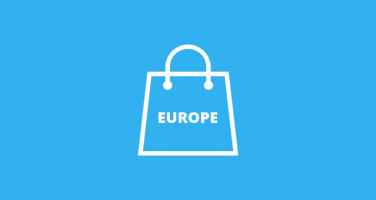Top 10 Largest E-commerce Companies in China
Are you looking for top largest e-commerce companies in China? Here is a list of the largest e-commerce companies in China that you should know.... read more...
-
Tencent Holdings (OTC: TCEHY) is a company that provides Internet, mobile services, and online advertising. It was founded in 1998. It is headquartered in Shenzhen and is the developer of popular Chinese Internet platforms such as QQ Instant Messenger, QQ.com, QQ Games, Qzone, QQ Music, QQ wallet, WeChat, and Tenpay.
Tencent's diverse products have resulted in the company hosting China's largest online community. Their products are so widely available and integrated across multiple platforms that it is impossible to go a day in China without using them. As a result, Tencent Holdings has spent a lot of money promoting all of its services. As a result, Tencent has emerged as one of the most formidable competitors in the e-commerce market.
Tencent, the tech behemoth that owns WeChat, has been seeking a foothold in the e-commerce market for several years. It owns 17.1% of JD.com and a stake in Pinduoduo until October 2019. Tencent launched Xiao'e Pinpin, a WeChat mini-program similar to Pinduoduo's that uses a group-based social shopping model.
Tencent's WeChat announced (in Chinese) in a July company statement that it is testing a new mini-store built into the app called Weixin Xiaoshangdian. The WeChat store will have a livestreaming feature. WeChat's mini stores, if successful, could be a game changer for China's e-commerce industry.
Although WeChat was not previously an e-commerce retailer, it has been involved with the industry through its mobile payment and advertising services. WeChat Pay, its digital payment service, had over 800 million monthly users in 2019. Some bloggers have made millions of yuan by displaying product advertisements on their WeChat pages.
Founded: 1998
Headquarters: Shenzhen, China
Official web: tencent.com/en-us/

Image on tencent.com Video via CNBC International channel on Youtube -
Alibaba (NYSE: BABA) is the largest e-commerce company on this list, offering an online marketplace for domestic retail, wholesale trade, and international e-commerce. In 1999, former English teacher Jack Ma ( M Yn) established the Alibaba Group. His company is now the world's largest online retailer. Alibaba controls more than half of the Chinese e-commerce market. The Alibaba Group owns many different e-commerce sites.
Alibaba's largest sites aimed at Chinese consumers are Taobao Marketplace and Tmall.com. Taobao sellers are mostly individuals and small businesses. Taobao is a consumer-to-consumer (C2C) platform. Tmall is a leading B2C (business-to-consumer) retail platform that enables local and international sellers to directly reach consumers online. Taobao Mall first opened its doors in 2008. In mainland China, Hong Kong, Macau, and Taiwan, they sell everything from clothing, shoes, and cosmetics to packaged foods.
Aliexpress was founded in 2010 as a platform for Chinese businesses and individuals to sell their wares to international online shoppers. It is now Russia's most popular e-commerce platform. Cainiao, a package delivery and logistics company that allows Alibaba and any other company to manage their own deliveries and logistics, was founded in 2013 by Alibaba and six Chinese logistics companies.
In 2016, Alibaba acquired Lazada, a Singapore-based e-commerce company that is one of the largest in Southeast Asia. In September 2019, Alibaba paid $2 billion to NetEase for Kaola.com, an online marketplace that sells imported goods to Chinese consumers.
The 2004 launch of Alipay was a critical component of Alibaba's dominance of the Chinese internet sector. Initially a PayPal clone, the service has evolved into one of China's two major mobile payment systems, the other being WeChat Pay. Alipay is now a subsidiary of Alibaba affiliate Ant Group, which provides a range of financial services such as investing, credit, and a variety of insurance products.
Founded: 1999
Headquarters: Hangzhou, China
Official web: alibabagroup.com/en-US/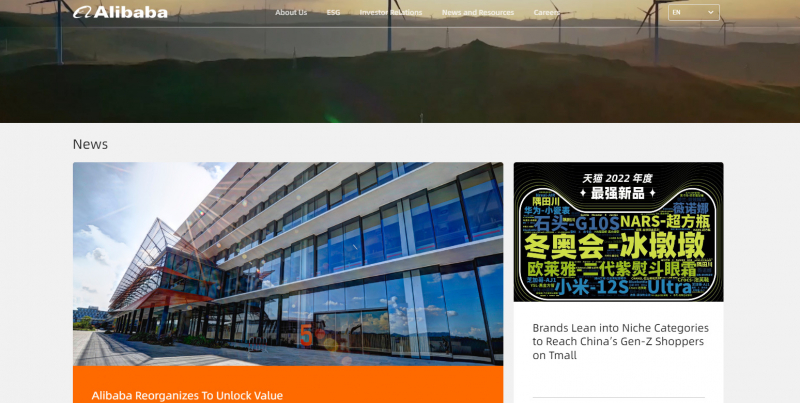
Image on alibabagroup.com Video via CNBC International channel on Youtube -
Zhang Tao founded Meituan Group in 2010, which later merged with Meituan-Dianping in December 2015 and is headquartered in Beijing, China. In September 2020, Meituan-Dianping officially changed its name to Meituan (3690.HK). Meituan creates and operates a platform that offers retail and online group purchasing services. It sells and delivers Chinese food from local restaurants via the internet. It runs a social commerce website that provides online group discounts for movie tickets, groceries, food, restaurants, entertainment, and health and fitness.
From food delivery to travel booking, Meituan has earned the moniker "Amazon of Services" in China by offering a diverse range of services that touch nearly every aspect of the lives of Chinese people. Now, the massive service app is venturing into Amazon-like territory and selling physical goods, putting it in direct competition with local retail behemoths such as Alibaba, JD, and Pinduoduo.
Meituan, which operates on a platform model, already has a foothold in physical goods e-commerce. Meituan is one of the most popular options for on-demand or next-day delivery of fresh produce and groceries. However, this represents only a small portion of China's trillion-dollar online retail market.
Beginning with food and beverages, Meituan now aspires to be a full-service e-commerce platform, selling not only daily services (food deliveries) and groceries but also tangible goods such as consumer electronics, cosmetics, and clothing.
Meituan began offering direct sales services for physical goods in early March 2022. Meituan's pilot shopping review feature, Zhenxiang, was rebranded as Guangguang and formally launched this month with additional social and entertainment elements. Furthermore, the everything app dipped its toe into the hot cross-border shopping sector by incorporating a global retailing section into its main app's e-commerce channel.
Founded: 2010
Headquarters: Beijing, China
Official site: about.meituan.com/en
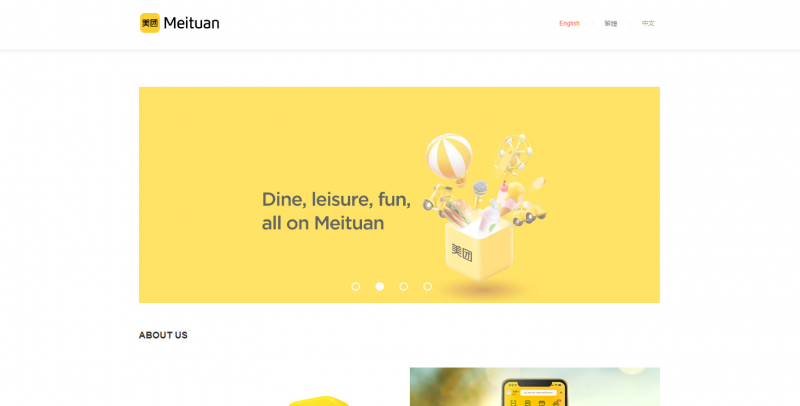
Image on about.meituan.com Video via Asianometry channel on Youtube -
Pinduoduo Inc. (Nasdaq: PDD) is China's largest agriculture-focused e-commerce platform. Pinduoduo has skyrocketed since its 2015 launch to become China's fastest-growing e-commerce company, with a 7.3% market share, thanks to its popular group-buying business model.
Pinduoduo has ambitious plans to increase sales to $145 billion per year by 2025. Pinduoduo had 731.3 million active buyers (over the previous year) as of September 2020, with 643.4 million of them using the website monthly in 2020. Pinduoduo has introduced new market trends, such as social commerce and consumer-to-manufacturer (C2M), that have revolutionized e-commerce in China.
Pinduoduo is also the largest online agricultural product seller in China. It connects farmers and distributors directly with consumers. In 2019, it launched the AI-powered Duoduo Farm to help farmers in China's impoverished counties sell online and increase their productivity. Approximately 600,000 distributors sold farm produce through Pinduoduo.
Pinduoduo launched Duoduo Livestream in January 2020, allowing salespeople to promote their products through live video on the Pinduoduo app. As part of its Help the Farmers campaign, the company combined these two services to respond to the COVID-19 outbreak.Pinduoduo collects surplus agricultural produce information and connects farmers and consumers by livestreaming the perishable stock. The service assisted 180,000 farmers in selling 120,000 metric tons of agricultural produce between February 10 and March 18.
Caixin News reported in June 2020 that Pinduoduo, the five-year-old retailer, had surpassed JD.com to take the number two spot in market share dominance. Customers are invited to form groups with others who want to purchase the same product under the group-buying business model. If a large enough quantity of the product is purchased, this can result in discounts as high as 90%.Pinduoduo also promotes the previously mentioned consumer-to-manufacturer (C2M) model. In response to the need for a new way to buy groceries during the pandemic, they launched Duo Duo Maicai in August 2020, a grocery service where consumers can place orders online and pick them up the next day.
Founded: 2015
Headquarters: Shanghai, ChinaOfficial web: en.pinduoduo.com/

Image on en.pingduoduo.com Video via Pinduoduo Inc channel on Youtube -
Jingdong, also known as JD.com (NASDAQ: JD), is China's second-largest e-commerce retailer, accounting for approximately 17% of the market in 2019. 360buy.com, based in Beijing, debuted in 1998 before rebranding to JD (NASDAQ: JD) in 2013.
JD.com is a business-to-consumer (B2C) online retailer. JD Mall sells electronics and home appliances, as well as clothing, food, and books. Furthermore, JD Mall enables local sellers to open their own "shops" on the website and import food, beverages, clothing, and shoes.
JD.com is at the forefront of China's e-commerce push toward automated and drone deliveries. It started building a drone airport last year and unveiled its first autonomous truck. JD.com made its first delivery with an autonomous robot vehicle on February 6, 2020, in Wuhan, delivering medical supplies to a local hospital while avoiding human-to-human contact.
JD.com is primarily a direct seller, similar to Amazon, but it also has a marketplace and, like Alibaba, its own delivery and logistics network. Tencent, Google, and Walmart are among the international behemoths that have invested in JD.com to help it compete with Alibaba.Tencent's recent moves, however, suggest that its strategic partnership with JD.com may soon become a rivalry. Tencent reduced its stake in JD.com from 20% to 17.1% in early 2020. Tencent launched a WeChat mini store in April, competing with the JD.com mini store that has been displayed in the WeChat app since 2017. Tencent has also increased its investment in MissFresh, a start-up that competes with JD.com and Walmart's joint venture, JD Daojia.
Founded: 1998
Headquarters: Beijing, China
Official web: global.jd.com/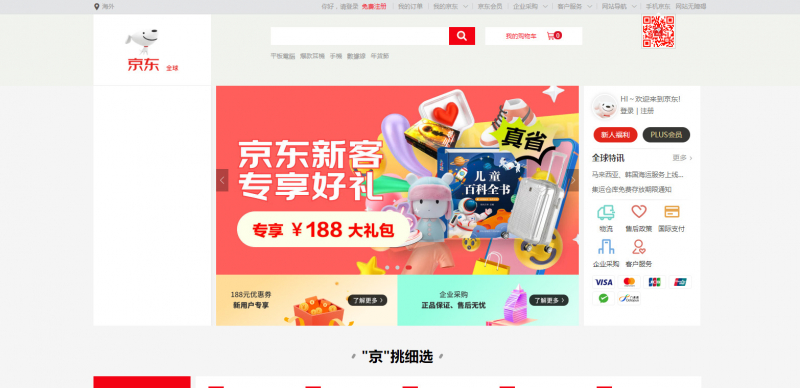
Image on global.jd.com Video via JD.com, Inc. channel on Youtube -
NetEase, Inc. (NASDAQ: NTES) was founded in 1997 and is headquartered in Hangzhou, the People's Republic of China. NetEase.com, Inc. was the company's previous name before changing to NetEase, Inc. in March 2012. NetEase, Inc. is divided into three divisions: online game services, Youdao, cloud music, innovative businesses, and others. It provides information technology solutions and services in the People's Republic of China and internationally. Gaming, advertising, and e-commerce are examples of these.
NetEase provides a wide range of desktop and mobile e-commerce solutions to Chinese consumers. Furthermore, they offer a platform for sellers and a wide range of products, such as e-readers, matchmaking services, online music, and social networking. It is ranked fifth on the list of China's largest e-commerce companies.
In 2015, NetEase, Inc. launched Kaola.com, which operates similarly to Amazon.com and has approximately 15 million users. In recent years, NetEase, Inc., has expanded into international markets such as Japan and North America. In addition to its own game content, NetEase, Inc. collaborates with other leading game developers, such as Blizzard Entertainment and Mojang AB (a Microsoft subsidiary), to operate globally renowned games in China.
NetEase's other innovative service offerings include its majority-owned subsidiaries Youdao (NYSE: DAO), China's leading technology-focused intelligent learning company, and Cloud Village (HKEX: 9899), also known as NetEase Cloud Music, China's leading online music content community, as well as Yanxuan, NetEase's private label e-commerce platform.
NetEase, Inc. also operates Yanxuan, an international and private label e-commerce business that sells consumer electronics, food, apparel, homeware, kitchenware, and other general merchandise. The company competes with major players such as Alibaba (NYSE: BABA), Amazon.com, Inc. (NASDAQ: AMZN), Walmart (NYSE: WMT), and JD.com (NASDAQ: JD).
Founded: 1997
Headquarters: Hangzhou, ChinaOfficial web: ir.netease.com/
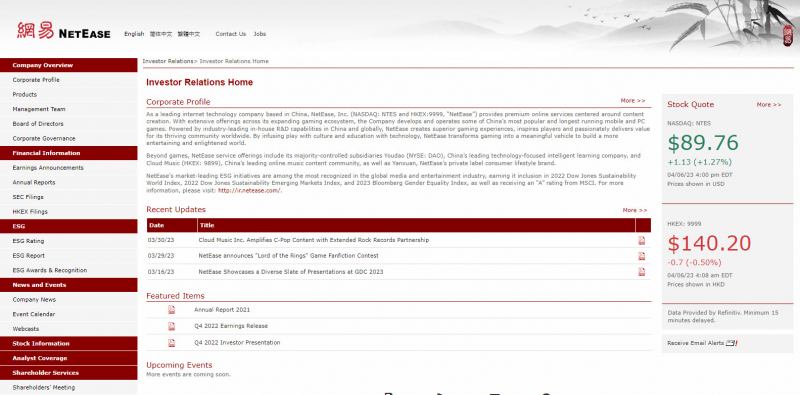
Image on ir.netease.com Video via TD Ameritrade Network channel on Youtube -
Baidu, Inc. (NASDAQ: BIDU) was founded in Beijing in 2001. Baidu, Inc. is the leading provider of Chinese-language Internet searches. Baidu aims to provide the best way for people to find information as a technology-based media company.
Baidu, in addition to serving individual Internet search users, offers a powerful platform for businesses to reach out to potential customers. Baidu has already set up a new department dedicated to the development of cutting-edge e-commerce technologies.
Baidu provides information technology solutions, online marketing services, and an e-commerce platform. Baidu Wallet is an online payment service that allows users to quickly and easily complete closed-loop transactions. Baidu Wallet is available on all Baidu platforms as well as other third-party products.
Users can use Baidu Nuomi to buy movie tickets, order food, or arrange daily commutes using Uber. iQiyi, a subsidiary of Baidu, is a major player in the online video market. They have created numerous highly successful web series and reality shows that are watched by millions of people on a regular basis.
Chinese internet giant Baidu has integrated a shopping channel into its main app and plans to restructure the Baidu Shopping platform in 2021, allowing its 204 million daily active users to buy directly after searching. Baidu Duxiaodian is the name. It does have many features in common with Google Shopping. It also has some innovative features that you may not be able to learn from Google Shopping.
When a Baidu user activates the shopping channel and conducts a product search, the app will display results from dozens of online malls, such as JD.com, Suning.com, Alibaba's cross-border platform Kaola, and Baidu's Duxiaodian. The product link will seamlessly redirect the user to the appropriate site to complete the transaction. A simple search within the channel returns only products from Duxiaodian that are "livestreamed."
Founded: 2001
Headquarters: Beijing, China
Official web: https://www.baidu.com/
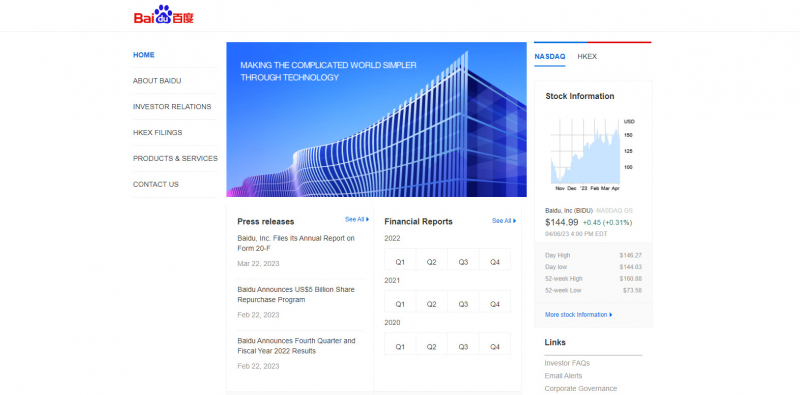
Image on ir.baidu.com Video via CNBC International channel on Youtube -
Suning.com Co., Ltd., formerly Suning Commerce Group Co., Ltd., is a Chinese e-commerce company. Suning.com is a Chinese retailer that sells clothing, snacks, electronics, appliances, and other items. Suning.com was founded on May 15, 1996, in Nanjing, China, and is headquartered there.
Suning.com Co., Ltd. provides e-commerce services and operates an offline shopping network, which includes two small-sized store brands — Suning Convenience Store and Suning Retail Cloud Store — as well as department store brands Suning Plaza and Carrefour Community Center, as well as specialty stores such as Suning Sports, Suning Cinema, Suning MotorShip, SuFresh, Redbabay, and JIWU.
Suning.com Co., Ltd. is a company that provides internet retail services. It focuses on three business units: retail, finance, and logistics. It provides a large data supplier's brand promotion, product customization, and supply chain management services through an online and offline digital service network. Laox, a Japanese retail company, is also owned by Suning.com.
Suning.com Co., Ltd. expanded internationally by establishing a research and development center in the United States. In 2009, it also entered the online sales business. In 2013, the company's name was changed to Suning Commerce Group. It was previously known as Suning Appliance. In 2018, the company's name was changed once more to Suning.com.
Founded: 1996
Headquarters: Nanjing, China
Official site: suning.com/
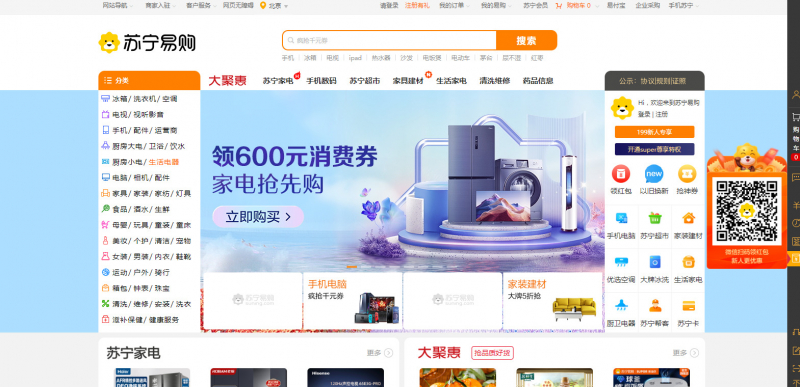
Image on suning.com Video via BASIC E-COMMERCE channel on Youtube -
Xingyin Information Technology Shanghai Ltd. is a platform that operates online. The company exchanges cross-border buying information, offers shopping tips and strategies, recommends products, and provides other related services. Xingyin Information Technology Shanghai does business both domestically and internationally and operates the social media and e-commerce platform Xiaohongshu.
Xiaohongshu is a social media and e-commerce platform. Xiaohongshu means Xingyin Information Technology (Wuhan) Co., Ltd , a branch of Xingyin Information Technology (Shanghai) Co., Ltd. Xiaohongshu, also known as Little Red Book in English, was founded in 2013 and is a fashion-focused app that combines social media and e-commerce.
Xiaohongshu has over 300 million registered users, with over 85 million of them active monthly. It operates RED Mall, which sells international goods to Chinese consumers. Xiaohongshu assists travelers in planning their overseas shopping lists, which contributes to the site's current global and high-end feel.
Xiaohongshu features products from over 8,000 verified brands, including Kim Kardashian's makeup line, KKW. Influencers create their own product reviews for high-end and luxury international brands, write fashion blogs, and post other lifestyle content. Users can buy products that have been reviewed directly from the posts about them.
Xiaohongshu claims that its name has nothing to do with the well-known book of Chairman Mao's quotations. Xiaohongshu cultivates a sense of community among its base of fashion-obsessed young women, who prefer its content to the often bot-filled reviews on other e-commerce platforms.
Xiaohongshu was founded as a platform for users to share product reviews. Nonetheless, it has concentrated its efforts since 2014 on its own e-commerce platform, through which Chinese consumers can order directly from overseas. Seventy-five percent of its 300 million registered users reside in first- and second-tier cities. Alibaba and Tencent are both investors in Xiaohongshu. The startup revealed plans to seek a $6 billion valuation in January.
By 2017, Xiaohongshu had CN 10 billion in revenue, making it one of the largest community e-commerce platforms. The same month, they launched REDelivery, an international delivery service. In 2017, they also held a shopping festival to commemorate their fourth anniversary, which drew more than CN 100 million in sales revenue in just two hours.
Founded: 2013
Headquarters: Shanghai, ChinaOfficial web: xiaohongshu.com/
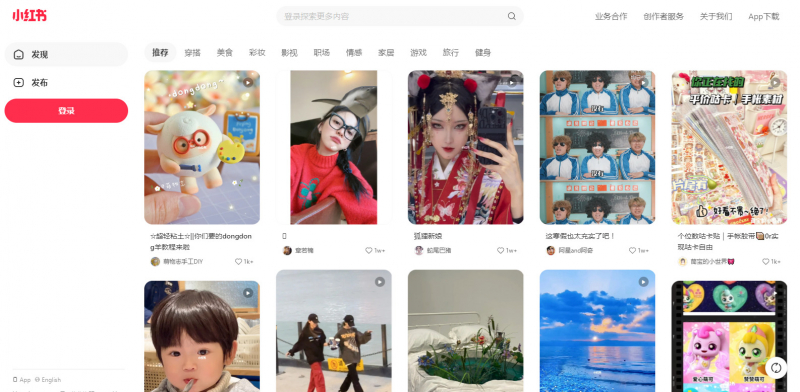
Image on xiaohongshu.com Video via Xiaohongshu channel on Youtube -
Vipshop (NYSE: VIPS) is a Chinese corporation that owns and operates the e-commerce website VIP.com (formerly Vipshop.com), which specializes in online discount sales and offers great deals on luxury and high-end labels. Vipshop is headquartered in Guangzhou, Guangdong, China, and debuted on the New York Stock Exchange (NYSE) on March 23, 2012.
VIP.com claims to be different from other e-commerce sites because of its emphasis on women, who account for more than 80% of its customer base. VIP.com had 52.1 million customers as of 2017, and 269.8 million orders were placed in 2016. VIP.com currently sells over 20,000 brands and has offices in both New York and Los Angeles. As part of London Fashion Week in 2018, it hosted a Chinese fashion show. It has surpassed Tmall and JD.com to become China's third-largest e-commerce site.
VIP.com was ranked 115th in the 2017 China 500 list, as well as the top three B2C e-commerce retailers, according to the US Fortune magazine. VIP.com was named the world's fastest-growing retailer in the 2017 Top 250 Global Powers of Retailing report, co-authored by Deloitte and STORES Media. VIP.com was ranked 40th in BrandZTM's Top 100 Most Valuable Chinese Brands in 2017.According to I Research, VIP.com's online discount sales model is one of China's three mainstream e-commerce models (the other two are the market place model of Tmall and the general B2C model of JD). VIP.com is the market leader in China's online discount market, with a 38.1% market share.
Founded: 2008
Headquarters: Guangzhou, China
Official web: vip.com/
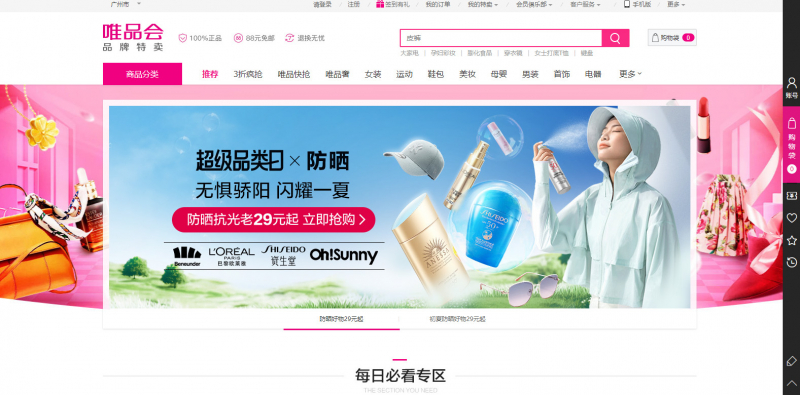
Image on vip.com Video via ROI Festival channel on Youtube























